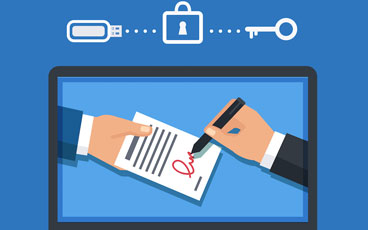
Since technology is leading towards advancement and digitalization. Signatures have also transformed their state. People from different corners are using digital signatures in place of conventional signatures. And, Information Technology Act,2000 has talked widely about digital signatures. But, there are some circumstances in which a digitally signed certificate is needed which ensure authenticity and security between two parties in a legal agreement. Hence, these certificates are needed to be issued through certified authorities.
What is a digital signature, and digital signature certificate?
A digital signature is a method used to authenticate any confidential information, software, or document digitally.
Similar to handwritten signatures, digital signatures are also unique, given by a trusted service provider. That means when anyone signs any of the documents, his identity is first validated and then the signature is encrypted through a public key infrastructure technology. In short, digital signatures are more sort of a digitally handwritten signature, but it provides far more security and privacy in digital communications.
A digital signature certificate is a unique and secure key issued by certifying authorities to prove one’s identity to access information or services on the Internet.
It contains information about the user’s name, country, Pincode, date of issuance of the certificate, E-mail address, and certifying authority name.
In short, one can say that Digital signature certificates are identical to physical or paper certificates like passports or driver’s licenses, which can be electronically presented to prove one’s identity.
What is Public-key Cryptography and how digital signatures are associated with it?
Public key cryptography is a method that uses a pair system of keys either public or private. These pair of keys are used to encrypt and decrypt data to protect it from unauthorized access. This ensures the privacy, security, and authenticity of the document.
Digital signatures work on the same principle, the private key encrypts data that is available to the signer, and the public key decrypts the data associated with the digital document that will be given to the receiver. Both the parties must have a digital certificate issued from a certified authority to connect the signature and their signer digitally. Having a digital certificate ensures authentication, which means data sent from the sender is real and genuine and has not been altered.
What are the different classes associated with the Digital Signature Certificate?
There are primarily three different classes of the digital signature certificate, i.e., Class1, Class 2, and Class 3.
- Class1 Digital Signature Certificate: These certificates would be issued to private or individual subscribers and will confirm that the user’s name and e-mail address form a clear subject within the database of certifying authorities.
- Class2 Digital Signature Certificate: These certificates shall be issued to both private and business individuals for tier personnel or private use. These certificates will confirm that information provided by the subscriber is genuine and does not clash with the consumer’s database.
- Class3 Digital Signature Certificate: These certificates will be issued to particular individuals as well as businesses or other organizations. These certificates are highly-assured certificates that are majorly intended for E-commerce applications. They are issued to the individuals only on their physical outlook before the certifying authorities.
Apart from that one can know about:
Aadhar OTP class of certificates: These certificates Aadhar eKYC are those classes of certificates that shall be issued to the individuals for their personal use. These certificates are based on OTP verification of the subscriber via Aashar eKyc. These certificates will confirm that digital signatures given by the subscriber are the same as the information preserved in Aadhar databases.
Aadhar biometric class of certificates: These certificates Aadhar KYC-biometric are those classes of certificates that shall be issued to the individuals based on the biometric verification of the subscriber. These certificates will confirm that information in the digital signature certificates given by the subscriber is the same as the information preserved in Aadhar databases.
What are the advantages of Digital Signature Certificates?
Physical signatures or hand-written signatures have been replaced by digital signatures which ensure several advantages and convenience to the individuals. Digital signature certificates provide individuals and entities with a chance to sign various confidential documents such as employment, legal agreement, legal papers, etc with ease and security. Apart from that Digital signature certificates offer other advantages to individuals.
Here are some of them:
- Document Security and Authenticity: In today’s world where everything is shifting towards a digital world, it becomes really crucial to protect our confidential data from hackers. Safeguarding identity is very important and with the digital signature, one can easily do that. It prevents our sensitive data as it is PIN and password protected. The date and time mentions give a track of information which ultimately reduces the risk of phishing e-mails and fraud.
- Information Integrity: Documents that are digitally signed cannot be edited or changed by any means. For validating and authorizing these certificates, the Government usually requests these digitally signed certificates. Now, digital signature certificates are quite famous due to global acceptance and legal compliance. In addition, they are acceptable as evidence or proof in the legal courts as well.
- Time and money advantages: Digital Signing certificates have made the environment friendly and reduced the storage space through its paperless mode. Now, there is no need for physical signing the hard copies, one can easily send digitally signed documents or PDF files in a fraction of seconds. This ultimately helps to save valuable time and money for businesses when it comes to signing a deal. One can easily sign the documents with a few clicks.
- Customer Experience: No matter where you stay, what is your location? One can comfortably sign vital documents with ease and perfection. This has simplified the business ways.
Digital signatures have been proven to be a bigger advantage to people who live especially in remote areas. As they do not need to present themselves for mundane work in banks or offices. These certificates are issued for a period of one or two years. Therefore, they need to be renewed after the expiration.



